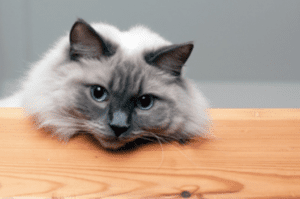 There’s a common misconception that cats are not affected by heartworm disease; we’re here to tell you that is false! So, if felines can get heartworm disease, is it the same as canine heartworms? Is it preventable? Let us help fill you in on the important facts surrounding how heartworm disease can affect our feline family members.
There’s a common misconception that cats are not affected by heartworm disease; we’re here to tell you that is false! So, if felines can get heartworm disease, is it the same as canine heartworms? Is it preventable? Let us help fill you in on the important facts surrounding how heartworm disease can affect our feline family members.
Feline and canine heartworm disease are the same in that they both are caused by a bite from an infected mosquito and can be potentially fatal. The difference is in the nature of the disease, and how it’s detected and diagnosed.
Heartworm Disease in Felines
Unlike dogs, cats are not a natural host for heartworms – which means the larvae will likely have a shorter lifespan. Fortunately, this makes it more difficult for heartworms to affect the larger organs, but can create significant heart, pulmonary artery, and respiratory problems. While it is less likely cats will get heartworm, this doesn’t mean it can’t happen. Studies indicate that a solid approximation would be 10%; so, for every 100 dogs that are heartworm positive, there will be 10 positive cases of feline heartworm.
In the cases feline heartworm, many cats will not show symptoms ultimately making it a difficult disease to detect. Often times, the symptoms – including coughing, vomiting, lethargy, loss of appetite, and even weight loss – mimic those of other common diseases. If your cat is showing any of these symptoms, please contact us immediately.
Here is an incredibly important fact: There are both oral and topical prescriptions that can help PREVENT heartworm disease from occurring; however, there are currently no approved drugs for TREATING heartworm in cats. So, if your cat becomes infected, any treatments to kill adult heartworms can cause incredible health complications for your pet. As the adult worms die and pass through the arteries to the lungs of your cat when attempting heartworm treatment, it can cause failure in the lungs and sudden death of your beloved feline companion.
Talk with us at your next appointment to review the risks for your cat, and to discuss prevention opportunities that may work best for your individual pet. As your trusted partners in pet healthcare, we want to help you ensure that your pet leads the healthiest and happiest life possible!

